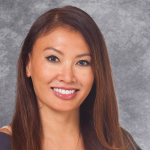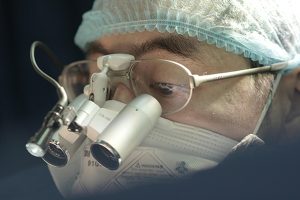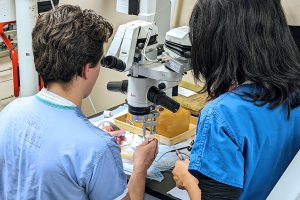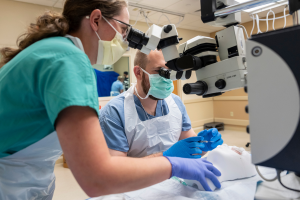The oculoplastic surgeons at the University of Wisconsin Department of Ophthalmology and Visual Sciences are nationally and internationally recognized for their expertise in ophthalmic plastic and reconstructive surgery. They hold leadership roles in top professional organizations, including:
- American Society of Ophthalmic Plastic and Reconstructive Surgery
- North American Society of Academic Orbital Surgeons
- American Academy of Ophthalmology
- Women in Ophthalmology
- Wisconsin Society of Ophthalmic Plastic and Reconstructive Surgeons
Our faculty have published hundreds of peer-reviewed articles, contributed to leading textbooks, and regularly lead skills-transfer courses at national and international conferences. They also contribute to the AAO’s EyeWiki, which has reached over 20 million readers worldwide.
Are You a Patient? Visit UW Health to Find a Specialist:
UW Health
Clinical Care
Our oculofacial plastic surgery team delivers the full spectrum of care — reconstructive, functional, and cosmetic — with precision, compassion, and innovation. We specialize in the use of the latest cutting edge technologies and techniques, such as corneal neurotization. We treat a range of complex conditions such:
- Eyelid malposition
- Orbital tumors
- Thyroid eye disease and Graves Disease
- Facial nerve disorders
We take a comprehensive and collaborative approach. We partner with experts across multiple departments – including ENT, dermatology, oncology, endocrinology, plastic surgery, and physical therapy – to ensure every patient receives personalized care.
We also lead and participate in specialized clinics, including:
- Facial Nerve Clinic
- Melanoma Tumor Board
- Vascular Anomalies Clinic
What truly sets us apart is our commitment to whole-person care. Our patients’ stories reflect not only our surgical expertise but also the deep compassion and dedication we bring to every case.
One of my favorite types of surgeries to perform is reconstruction following Mohs surgery for skin cancer — it requires lots of creativity, and every case is different.
Suzanne W. van Landingham, MD
Education
Oculoplastic surgery education has been an integral part of our department since 1968, when it was founded by Dr. Richard Dortzbach, a pioneer in the field of ophthalmic plastic and reconstructive surgery.
Today, under the leadership of Dr. Mark Lucarelli, our Oculofacial Plastic Surgery Fellowship is recognized as one of the premier programs in the country. Fellows benefit from:
- A high-volume surgical experience
- A strong academic and research environment
- Close mentorship from nationally recognized faculty
Our graduates go on to lead in academic and clinical settings across the country. Many even return to the UW to teach and collaborate.
We also offer the Essential Oculoplastics course, a three-year progressive curriculum that gives ophthalmology residents hands-on training in core surgical techniques. Education at the University of Wisconsin goes beyond training — it builds lasting relationships. Our alumni stay connected through the White Coat Society, which gathers annually at the American Academy of Ophthalmology meeting to celebrate shared experiences and lifelong friendships. We’re proud of our educational legacy — and even prouder of the vibrant, supportive community it continues to inspire.
Research
Or oculoplastics faculty bring the same passion for excellence to research as they do to patient care — driven by curiosity, collaboration, and a commitment to progress. Their work spans the full spectrum of oculofacial plastic surgery and often involves partnerships with experts in:
- Radiation and human oncology
- Vascular anomalies
- And other specialties to explore new frontiers in care.
We also lead and participate in large-scale clinical trials, particularly in the development of pharmaceutical treatments for Thyroid Eye Disease. These efforts are not just academic — they directly translate into better outcomes and more effective care for our patients. Through research, we’re we’re not just keeping up with the future of oculoplastics — we’re helping shape it.
Are You a Patient? Visit UW Health for More Information:
UW Health





